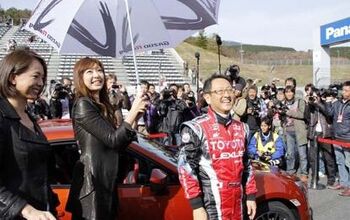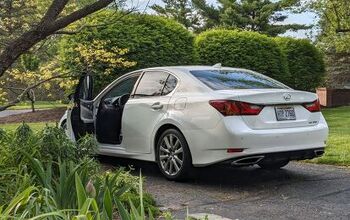General Motors Could Be The World's Largest Automaker In 2010

So who will be the world’s largest automaker this year? Like it or not, this is decided by numbers of units produced, size doesn’t matter. Some time in summer 2011, OICA will publish the official worldwide manufacturer ranking. Let’s try to figure out the top three. Number 3 is easy:
Volkswagen will remain in the number 3 position. Wolfsburg hasn’t made year-end projections, but according to a press release, they had delivered 6.59 million units by end of November. Group Board Member for Sales Christian Klingler anticipates “a new delivery record of more than seven million vehicles for the full year.” Easy for him to say. If Volkswagen keeps up the momentum, they will end the year at around 7.2 million units. There is nobody in sight that could come up behind them. Last year, the number 4 position was held by Ford with 4.68 million units made, followed by Hyundai with 4.64 units. Despite vigorous growth at both, none of them will get close to VW. But reading the tealeaves , it looks like Ford and Hyundai could be trading places, with Hyundai in number 4.
Now who will be That will remain an open question until both Toyota and GM will release their fourth quarter and whole year data. Toyota has been quite forthcoming. In a press release published a few days ago, Toyota expects total worldwide production of 8.55 million units by the end of 2010. That number includes Daihatsu and Hino, because that’s how the number will be reported to OICA (give or take a few.) Be careful when you see Toyota numbers. You will see some that count the Toyota brand only, and as far as the global ranking goes, that makes as much sense as Volkswagen without Audi, or GM without the more than a million Wuling vans in China.
What about GM? GM does not publish global production numbers, except in their quarterly results. An email request by TTAC, asking for global production data through November, remained unanswered. So we have to guess. As educated as possible. Going through GM’s international sales reports is a frustrating exercise. There is no consistency. The only reliable data we have to go by is GM’s third quarter report. In the first nine months of 2010, GM and its joint ventures produced 6.445 million units. Assuming they are keeping up that pace – and there are no signs of slackening off – GM would end the year at 8.59 million units, slightly ahead of Toyota, and be again the world’s largest automaker. Toyota took that title in 2008, not because of Toyota’s sudden strength, but because of GM’s near-death experience.
Should GM miss that goal – the race between GM and Toyota will come down to the wire – then GM has all the chances in the world to solidly trounce Toyota in 2011. In its 2011 forecast, Toyota plans for a total 2011 production of 8.69 million, up from 2010 by only 2 percent. GM surely intends to do better than that.
If you are in the GM cheering section, go on your knees, face east and make a daily prayer that there is no bubble in China, and that Chinese sales will continue to grow, and that GM China’s Kevin Wale is right when he predicts 10 to 15 percent growth for the Chinese market in 2011. More than a third of GM’s worldwide production is Made in China. Chinese buy a lot more GM cars than Americans. Be careful of what you wish for: If you wish for an implosion of the Chinese market, you wish for the destruction on GM. No automaker in the world, not even China-heavy Volkswagen, is as dependent on China as GM.
A good deal of the secret of GM’s success rests in the footnote to GM’s quarterly report: “The joint venture agreements with SGMW (34%) and FAW-GM (50%) allow for significant rights as a member as well as the contractual right to report SGMW and FAW-GM joint venture vehicle sales in China.” Imagine: Without little Wuling, GM would be the size of Volkswagen.

Bertel Schmitt comes back to journalism after taking a 35 year break in advertising and marketing. He ran and owned advertising agencies in Duesseldorf, Germany, and New York City. Volkswagen A.G. was Bertel's most important corporate account. Schmitt's advertising and marketing career touched many corners of the industry with a special focus on automotive products and services. Since 2004, he lives in Japan and China with his wife <a href="http://www.tomokoandbertel.com"> Tomoko </a>. Bertel Schmitt is a founding board member of the <a href="http://www.offshoresuperseries.com"> Offshore Super Series </a>, an American offshore powerboat racing organization. He is co-owner of the racing team Typhoon.
More by Bertel Schmitt
Latest Car Reviews
Read moreLatest Product Reviews
Read moreRecent Comments
- FreedMike If Dodge were smart - and I don't think they are - they'd spend their money refreshing and reworking the Durango (which I think is entering model year 3,221), versus going down the same "stuff 'em full of motor and give 'em cool new paint options" path. That's the approach they used with the Charger and Challenger, and both those models are dead. The Durango is still a strong product in a strong market; why not keep it fresher?
- Bill Wade I was driving a new Subaru a few weeks ago on I-10 near Tucson and it suddenly decided to slam on the brakes from a tumbleweed blowing across the highway. I just about had a heart attack while it nearly threw my mom through the windshield and dumped our grocery bags all over the place. It seems like a bad idea to me, the tech isn't ready.
- FreedMike I don't get the business case for these plug-in hybrid Jeep off roaders. They're a LOT more expensive (almost fourteen grand for the four-door Wrangler) and still get lousy MPG. They're certainly quick, but the last thing the Wrangler - one of the most obtuse-handling vehicles you can buy - needs is MOOOAAAARRRR POWER. In my neck of the woods, where off-road vehicles are big, the only 4Xe models I see of the wrangler wear fleet (rental) plates. What's the point? Wrangler sales have taken a massive plunge the last few years - why doesn't Jeep focus on affordability and value versus tech that only a very small part of its' buyer base would appreciate?
- Bill Wade I think about my dealer who was clueless about uConnect updates and still can't fix station presets disappearing and the manufacturers want me to trust them and their dealers to address any self driving concerns when they can't fix a simple radio?Right.
- FreedMike I don't think they work very well, so yeah...I'm afraid of them. And as many have pointed out, human drivers tend to be so bad that they are also worthy of being feared; that's true, but if that's the case, why add one more layer of bad drivers into the mix?

































Comments
Join the conversation
If GM is focused on being number #1 in volume, they are doomed to repeat the mistakes of the past. GM needs to focus on profitability. You can be #1 and profitable, but profitability is the only thing that matters.
When has profitability ever been a top priority at GM? Take the Corvette for example. It should have been cancelled back in the '50s when they discovered that Americans just weren't that into buying true sports cars priced as high as the average home.